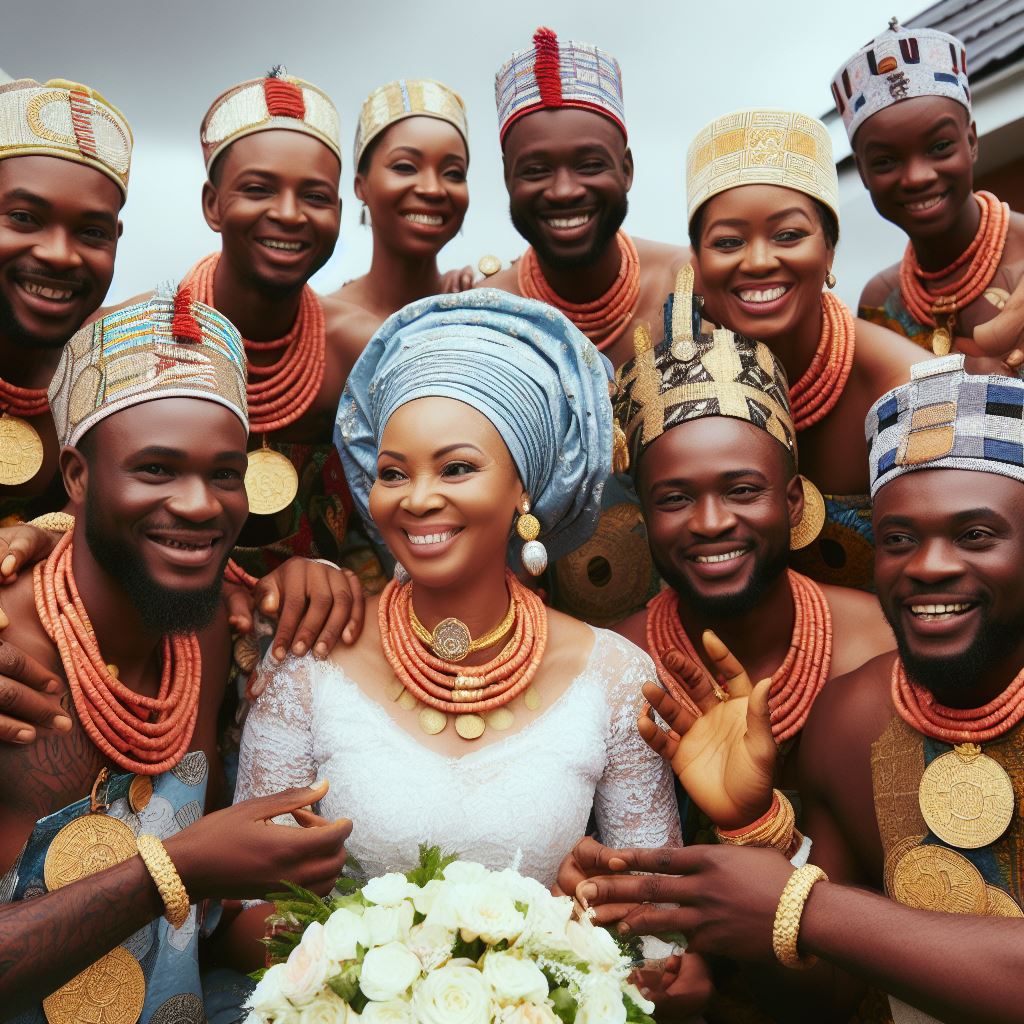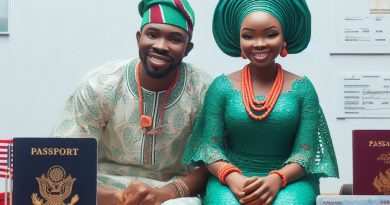Blending Cultures: Inter-tribal Anniversary Greetings in Nigeria
Last Updated on January 28, 2024
Introduction
Inter-tribal anniversary greetings in Nigeria are a symbolic way of celebrating unity and diversity.
Each ethnic group has its unique customs and traditions, and anniversary greetings provide a platform for blending these cultures.
These greetings are not mere formalities but hold deep significance.
They communicate respect, appreciation, and solidarity among tribes.
It is a powerful tool for fostering harmony and togetherness in a country with diverse tribes like Nigeria.
Inter-tribal anniversary greetings are essential for promoting cultural exchange and understanding.
They provide an opportunity for tribes to learn about each other’s customs, values, and history.
Moreover, these greetings contribute to national identity and unity.
By acknowledging and celebrating the anniversaries of other tribes, Nigerians share a sense of belonging and forged a collective identity.
Additionally, inter-tribal anniversary greetings help preserve cultural heritage.
They serve as a reminder of the rich and diverse tapestry of Nigeria’s ethnic groups, safeguarding the traditions for future generations.
Basically, inter-tribal anniversary greetings are an integral part of Nigerian culture.
They nurture unity, foster cultural exchange, and promote national identity.
By embracing these greetings, Nigeria continues to celebrate its diversity while maintaining a united front.
Importance of Anniversary Celebrations in Nigerian Culture
Significance of anniversaries in Nigerian society
Anniversaries hold a great deal of importance in Nigerian culture.
They are a time to commemorate special events, milestones, and achievements.
Anniversaries symbolize growth, progress, and the passage of time in Nigerian society.
These celebrations serve as a way to recognize and appreciate important moments in life.
They are a means of bringing people together and fostering a sense of unity and togetherness.
Anniversaries are often marked with joyous festivities, expressions of gratitude, and prayers for continued blessings.
These occasions are typically celebrated with family, friends, and the entire community.
They honor the past, celebrate the present, and anticipate a promising future.
Anniversaries generate a sense of pride and belonging among Nigerians.
They remind individuals of their cultural heritage and help preserve traditions for future generations.
Celebration as a way to honor milestones and relationships
- Celebrating anniversaries is a means of honoring significant milestones in Nigerian society.
- It is a way to recognize achievements, both personal and professional.
- Anniversaries provide an opportunity to acknowledge and appreciate individuals’ contributions to society.
- They serve as a reminder of the efforts, sacrifices, and dedication that lead to success.
- Celebrating anniversaries facilitates the expression of love, gratitude, and admiration for partners, family, and friends.
- It is a time to reflect on the relationships that have stood the test of time and express deep appreciation for support and companionship.
- Anniversaries allow for the strengthening of bonds between spouses, families, and friends.
- They create an atmosphere of love, unity, and harmony within households and communities.
- These celebrations reinforce the importance of relationships and encourage individuals to nurture them.
- Celebrating anniversaries instills a sense of commitment and responsibility in maintaining strong and healthy relationships.
Reflection on the growth and success of marriages
- Anniversary celebrations in Nigerian culture provide an occasion for couples to reflect on their journey together.
- They offer an opportunity to assess the growth and progress of the relationship.
- Anniversaries allow partners to reminisce about the triumphs, challenges, and lessons learned along the way.
- These celebrations encourage couples to appreciate each other’s strengths and acknowledge their support in difficult times.
- Reflection during anniversaries helps couples identify areas for improvement and set goals for the future.
- It is a time to reaffirm vows, renew commitment, and strengthen the foundation of the marriage.
- Celebrating anniversaries reminds couples of the love, trust, and companionship that form the pillars of a successful marriage.
- Anniversaries serve as a reminder to cherish and prioritize the sacred bond between spouses.
- Reflection on growth and success during anniversaries motivates couples to continue working towards a fulfilling and joyful marriage.
- These celebrations foster a sense of gratitude, contentment, and happiness in couples’ hearts.
Generally, anniversaries hold immense importance in Nigerian culture.
They serve as significant markers of events and achievements, a way to honor relationships and milestones, and an opportunity for reflecting on the growth and success of marriages.
Celebrating anniversaries not only brings joy and unity but also reinforces the values and traditions cherished by Nigerians.
Read: From First to Fiftieth: Nigerian Anniversary Milestones
Nigerian Ethnic Diversity
Description of Nigeria’s multicultural society
- Nigeria is a diverse nation with a rich multicultural society.
- It is home to over 250 ethnic groups, each with its own unique customs and traditions.
- The country is located in West Africa and is considered the most populous African nation.
- Nigeria’s multicultural society is a result of its colonial history and geographical location.
- It is a melting pot of various cultures, languages, and religions.
Various Nigerian tribes and their unique cultures
- Hausa-Fulani: This tribe is predominantly found in the Northern part of Nigeria and is known for its rich cultural heritage, including the unique traditional attire and the Hausa language.
- Yoruba: The Yoruba tribe is located in the Southwest region of Nigeria and is famous for its art, music, and vibrant festivals like the Oshun festival.
- Igbo: Found in the Southeast, the Igbo tribe has a unique language and a rich cultural heritage, including traditional dances and ceremonies like the New Yam Festival.
- Edo: Known for the ancient Benin Kingdom and its famous bronze art, the Edo tribe is found in the South-South region of Nigeria.
- Ijaw: The Ijaw tribe is located in the Niger Delta region and is famous for its traditional fishing practices and colorful festivals like the Ebeni Festival.
Challenges and benefits of inter-tribal marriages
- Inter-tribal marriages in Nigeria face challenges due to cultural, religious, and language differences.
- One of the main challenges is the pressure to conform to the traditions and customs of both families.
- Communication can also be a challenge when partners come from different tribes and speak different languages.
- However, inter-tribal marriages also bring numerous benefits, including the promotion of ethnic tolerance and understanding.
- They can enhance cultural exchange and contribute to the unity and diversity of the Nigerian society.
- Inter-tribal marriages can also create stronger family bonds by embracing different traditions and values.
Essentially, Nigeria’s multicultural society is a testament to its ethnic diversity.
The country’s numerous tribes each have unique cultures that contribute to the rich tapestry of Nigerian heritage.
Inter-tribal marriages may face challenges, but they also offer opportunities for cultural exchange and unity.
As Nigeria continues to celebrate its multiculturalism, it embraces its diverse tribes and cultures, fostering a sense of national pride and unity.
Read: Romantic Pidgin Phrases for Your Wedding Anniversary
Blending Cultures in Anniversary Greetings
The concept of blending cultures
- Blending cultures refers to the process of combining elements from different cultures to create something unique.
- It involves the exchange and integration of traditions, customs, and practices between communities.
- Blending cultures promotes inclusivity, diversity, and understanding among different ethnic groups.
- Through blending cultures, new traditions and festivities can be formed, strengthening social bonds.
- It allows people to celebrate their shared experiences while embracing their individual cultural identities.
Incorporating inter-tribal elements into anniversary greetings
- In Nigeria, inter-tribal marriages are becoming more common, leading to the need for anniversary greetings that resonate with both partners.
- Anniversary greetings can be enriched by incorporating elements from the tribes of both partners.
- This inclusion ensures that both individuals feel represented and their cultural backgrounds are honored.
- Language, music, clothing, and traditional symbols can be combined to create unique anniversary greetings.
- Blending inter-tribal elements in anniversary greetings promotes cultural harmony and strengthens relationships.
Examples of traditional anniversary greetings from different Nigerian tribes
Yoruba Tribe
- “Abo oro pupo o, ti a ko ni babalawo. Owo, ola, ayeye tiwa ni ilu ilu wa.”
- Translation: “Many good years together, we do not consult diviners. Wealth, blessings, and happiness in our home.”
Igbo Tribe
- “Ibu anyi elekwa oche oge na akwukwo, nkea bu ihe emezi na akwa anyi.”
- Translation: “You have made our days and years beautiful, and this is very significant to us.”
Hausa Tribe
- “Ai sai mutum gari, mun gode Allah, kuma zaka iya murna da gidanmu.”
- Translation: “Nothing is more valuable than a person, we thank God, and you can always be happy in our home.”
Ibibio Tribe
- “Ndito ediye owo o, efen ikot ododode. Anana oyayin, inehin iko mme ye uyai odudu.”
- Translation: “Years have gone by, like a journey of success. May celebrations, joy, and love continue to flow in our home.”
Tiv Tribe
- “Yo man tim baan, ngufan mbatsuan. Msen ijov kum, ikyaan mbajov kun iyangev.”
- Translation: “The years have been kind, like a gathering of happiness. May peace reign, like an endless flow of blessings on our union.”
Efik Tribe
- “Mfön idem mfo odiong, ke iso ndito eyo oyom mi.”
- Translation: “An abundance of joy and pleasant years, I celebrate the love of my life.”
Kanuri Tribe
- “Milingila dalgwe, kai ga duk in duniya. Zama we zama, da ibada da wangila.”
- Translation: “Thousands of greetings, may we live together forever. In good times and bad, with worship and loyalty.”
Ijaw Tribe
- “Chocolate, mandala, akumacanamunu. Gira, birisibe, opu odeiremini.”
- Translation: “Sweetness, peace, and prosperity. Happiness, good health, and long life upon our companionship.”
By combining elements from different Nigerian tribes, anniversary greetings become a beautiful representation of cultural diversity.
They provide an opportunity to celebrate love and harmoniously blend different traditions together.
Blending cultures in anniversary greetings reflects Nigeria’s rich heritage and promotes unity among its people.
Let us continue to embrace and honor the traditions that bring us together as a nation.
Read: Muslim Anniversary Greetings Unique to Nigeria

Delve into the Subject: Epic Marriage Quotes from Nigerian Literature
Common Inter-Tribal Anniversary Greetings
Overview of commonly used anniversary greetings in Nigeria
Anniversaries hold a special place in Nigerian culture, and inter-tribal anniversary greetings are a reflection of the country’s rich diversity.
These greetings serve as a way to celebrate milestones and foster unity among different tribes.
Meaning and significance behind the greetings
The anniversary greetings in Nigeria are not just empty phrases; they carry deep meaning and cultural significance.
They symbolize respect, honor, and well-wishes for the occasion, rooted in the traditions and values of each tribe.
Examples of greetings from different tribes and their translations/interpretations
Greeting from the Yoruba Tribe
“Eku odun, iyin ooo!”
Translation: “Happy anniversary, congratulations!”
Interpretation: This greeting expresses well wishes, happiness, and congratulations for the anniversary event.
Greeting from the Hausa Tribe
“Barka da ranar rayuwa!”
Translation: “Happy anniversary of life!”
Interpretation: This greeting acknowledges the significance of celebrating life and expresses joy for another year of togetherness.
Greeting from the Igbo Tribe
“Nnọọ ebeano, mopụtara anyị!”
Translation: “Congratulations to us, may it continue!”
Interpretation: This greeting emphasizes the unity among the people and expresses the desire for the anniversary celebration to continue in the future.
Greeting from the Fulani Tribe
“Barka da annabi!”
Translation: “Happy anniversary of the prophet!”
Interpretation: This greeting signifies the importance of religious and cultural milestones in the anniversary celebration.
Greeting from the Ijaw Tribe
“Ayiba o!”
Translation: “Well done!”
Interpretation: This greeting acknowledges the achievements and milestones of the anniversary event, expressing appreciation and recognition.
Greeting from the Tiv Tribe
“Ortar, kpa nguu!”
Translation: “Congratulations, keep prospering!”
Interpretation: This greeting shows enthusiasm for the anniversary and encourages continued growth and prosperity.
These examples highlight the diversity and uniqueness of anniversary greetings across Nigerian tribes.
Each greeting reflects the language, culture, and values present within the respective tribe, making these greetings an important part of inter-tribal communication and celebration.
In general, inter-tribal anniversary greetings in Nigeria serve as a bridge that connects different tribes.
They promote understanding, respect, and unity while celebrating milestones.
These greetings not only bring joy and happiness to the occasion but also contribute to the preservation of cultural identity.
They are a testament to the richness and diversity of Nigerian culture.
Read: Christian Anniversary Blessings for Nigerian Couples
Challenges and Solutions in Blending Cultures
Blending cultures in inter-tribal anniversary celebrations can be challenging, but with effective communication, mutual respect, and strategic planning, it is possible to create a harmonious and inclusive environment that celebrates the richness of both tribes.
Communication and understanding barriers in inter-tribal marriages
- Language differences can hinder effective communication and understanding between partners.
- Traditions and customs unique to each tribe may lead to misunderstandings and conflicts.
- To overcome communication barriers, couples should prioritize learning each other’s languages.
- Attending cultural events and festivals can help in understanding and appreciating different traditions.
By addressing communication barriers through language learning and cultural immersion, couples can foster better understanding and appreciation for each other’s traditions.
Respecting and valuing each other’s customs is crucial in maintaining a strong bond and preventing conflicts.
Importance of respecting and valuing each other’s traditions
- Mutual respect for one’s partner’s culture is vital in the success of inter-tribal marriages.
- Appreciating and embracing each other’s traditions create a sense of unity and harmony.
- Ignoring or disregarding one’s cultural practices can breed resentment and lead to relationship strains.
- It is essential to compromise and find a middle ground that respects both cultures equally.
Strategies for successfully blending cultures in anniversary celebrations
- Encourage open dialogue between both families to understand their expectations and customs.
- Incorporate elements from both cultures into anniversary celebrations to promote inclusivity.
- Plan and organize activities that showcase the diverse traditions and values of both tribes.
- Educate guests about the significance of different cultural practices to foster understanding.
- Be flexible and accommodate each other’s needs and preferences throughout the planning process.
- Involve both families in decision-making to ensure a balanced representation of both cultures.
- Embrace diversity and use the anniversary celebration as an opportunity to learn, grow, and appreciate each other’s cultures.
Prioritizing open dialogue
In anniversary celebrations, prioritizing open dialogue, inclusivity, and education can create an enriching experience for both families and guests.
Incorporating elements from both cultures allows everyone to feel involved and respected.
Flexibility and compromise
Flexibility and compromise play key roles in successfully blending cultures.
By accommodating each other’s needs and involving both families in decision-making, couples can avoid favoring one culture over the other.
Embracing diversity and using the celebration as a platform to learn and grow together will strengthen the bond between partners and their families.
Blending cultures is an ongoing journey that requires patience, understanding, and a genuine willingness to embrace diversity.
However, the rewards of creating a united and inclusive environment are immeasurable.
By overcoming challenges and celebrating each other’s traditions, inter-tribal couples can build a strong foundation for a lifelong journey of love and cultural appreciation.
Conclusion
In this blog post, we explored the fascinating world of inter-tribal anniversary greetings in Nigeria.
We learned that these greetings serve as a means of cultural exchange, fostering unity and understanding among different tribes.
Emphasis on the richness and beauty of inter-tribal anniversary greetings in Nigeria
The diversity of Nigeria’s tribes is reflected in the wide array of anniversary greetings used across the country.
Each tribe brings its unique language, customs, and traditions to these celebrations, adding to the richness and beauty of the occasion.
Encouraged continuous celebration and appreciation of cultural diversity in marriages.
It is important to recognize and appreciate the value of cultural diversity in marriages.
Inter-tribal relationships not only strengthen bonds between individuals but also contribute to the overall cultural fabric of the nation.
Therefore, let us continue to celebrate and embrace the beauty of blending cultures in Nigeria.
In a nutshell, inter-tribal anniversary greetings in Nigeria are a testament to the country’s cultural diversity.
By appreciating and participating in these traditions, we can promote unity and appreciation for our shared heritage.
Let us cherish and celebrate the blending of cultures in marriages, fostering a more inclusive and harmonious society.


